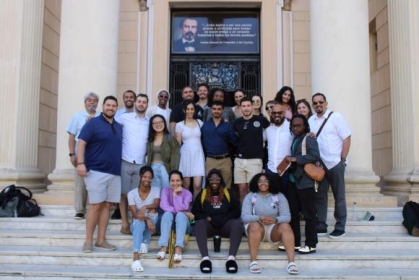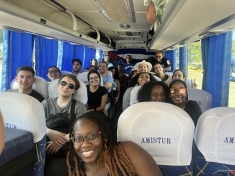Spring Break Travel Diaries: Cuba

Travel courses offered at Rutgers Law School this semester culminated in immersive, educational trips during Spring Break. One course, "Cuba Legal Field Study," introduces students to Cuba’s constitution, laws, and relationship to the U.S. firsthand.
Cuba may be just 90 miles off the U.S. coast, but its government, laws, and culture are a world away. That’s why it’s the educational destination of choice for Rutgers Law School Clinical Professor of Law Charles Auffant, who has brought a cohort of students to Havana practically every year since 2004. “This trip is designed to give law students a better understanding of comparative legal systems,” Auffant says. “But it’s also important to have contact with people if, and maybe especially if, we don’t have good governmental relations with them, so there is a basis to engage in diplomacy rather than violence.”
Leading up to the trip, students took a course focused on Cuban/U.S. history, the Cuban constitution, and the laws regarding travel from the U.S. to Cuba. Once they arrived, students heard lectures from University of Havana law professors and members of the National Union of Cuban Jurists (akin to the American Bar Association) on topics like legal education, family law, penal law, constitutional law, and more.
The group also participated in several cultural activities, including a visit to the Muraleando Community Project, where artists create masterpieces out of materials salvaged from a local landfill. “In this visit I saw resilience, talent, community, and the power of the human mind to create when given an opportunity,” says second-year law student Rebecca Doherty. “The Muraleando Community Project encapsulates the spirit of Cuba.”

In addition to their time spent in Havana, the group took a two-hour bus ride to stay overnight in “el campo,” or the countryside, in a rural city called Viñales. For Cuban-American second-year law student Gabriel Perez, this stop was one of the most impactful of the trip. “Their community’s strength and cooperation with one another was truly paradigm-shifting,” he says. “I was inspired by the resourcefulness of the people—a people constantly under siege but united in surviving and thriving even under strenuous conditions.”
Indeed, students returned home with a greater personal understanding of the impact the U.S. embargo has on the Cuban people. As Perez points out, so much of what Americans take for granted, from the food we eat to the technology we use, is unattainable for everyday Cubans. He says,“Their plight at our hands is an ongoing humanitarian failure, and one that will continue to leave a deepening scar on the United States, a country that purports to be a bastion of morality while subjecting the island nation to our south to a ruthless blockade.”